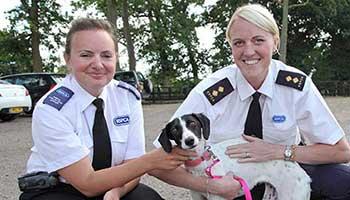Woman given horse ban after failing to address colt's multiple health issues
30.10.24
A woman from County Durham whose horse was so malnourished he was too weak to trot, has been disqualified from keeping equines for three years.
Rush (DoB 15.03.69) was handed the ban at a sentencing hearing at Peterlee Magistrates Court on 2 September after pleading guilty to causing the horse unnecessary suffering, following an investigation and prosecution by the RSPCA.
Magistrates were told that an RSPCA Inspector had met Rush at the entrance to a field in Pont Road in Leadgate, Consett on 28 February this year after the charity had been sent photographs of a bay horse who looked very underweight.
In her written statement the Inspector said: "Rush told me she knew he was in poor body condition but she had not taken his rug off as she was worried what was underneath.
"She told me she had been giving him haylage and feeding him three times a day. I asked if she had had a vet out and she said no but she had booked an equine dentist to go out on Saturday and I was shown a text message confirming the appointment.
"I was shown a bay pony, rising three years old. I could see he was in poor body condition even though he was wearing two rugs. His spine and hip bones were visible and the rug was angular over them.
"When it was taken off I saw he was in very poor body condition and covered in patches of fur loss along his back and over his face. He was very lethargic and withdrawn in his demeanour."
Rush was told by the Inspector that she wanted to get a vet out to look at the colt, and this was agreed. The vet who examined him confirmed that Marvel was in a suffering state.
There was a bath in the field for water which was bone dry and didn't look like it had been used for some time. Rush told the Inspector it was filled daily with water canisters but she said she didn't have them with her at the time. She was asked if she wanted to sign Marvel over into the care of the RSPCA - to which she agreed - and a transfer of ownership form was completed and signed.
The court was shown written evidence from the vet who examined Marvel at the field and another one who saw him later at a private equine yard. Blood analysis showed he had low red blood cells, calcium and protein, and high white blood cells that were consistent with a horse that was malnourished and fighting infection.
A lack of timely routine dentistry had also contributed to Marvel's poor body condition score, evidenced by ulcers on his jaw teeth which would have caused pain and discomfort and left him less inclined to chew food. Sharp enamel points and ulcers in equine mouths develop over several months but probably more than six, the court was told.
"In my opinion, based on the above evidence, Marvel was suffering at the time of presentation, as a result of the keeper's failure to address the skin infection and poor body condition," said one of the vets. "I was unable to ascertain whether the unwillingness to trot was due to lameness or lack of energy. Both the skin infection and poor body condition are chronic conditions, most likely developing for weeks.
"Overall for Marvel's body condition score, the combination of contributing factors - worms, lack of nutrition, dental pain, exposure, infection - are likely to have been significant for around two months, with Marvel suffering for approximately one month.
"The needs of Marvel have not been met in terms of protection from weather causing the skin infection, nor in terms of proper husbandry, nutrition or investigation of his poor body condition."
During the investigation, Rush claimed that someone else was responsible for caring for Marvel. Enquiries by the RSPCA revealed that others had provided food at times because they were so concerned about his poor condition.
In addition to the three-year ban, which Rush will not be able to contest for the duration, magistrates also imposed a fine of £576, a victim surcharge of £230 and a contribution towards costs of £300.
Marvel was cared for by the RSPCA's Felledge Equine Centre where he went on to make a full recovery and has since been rehomed. Rush has transferred the care of other horses she owns to someone else.


